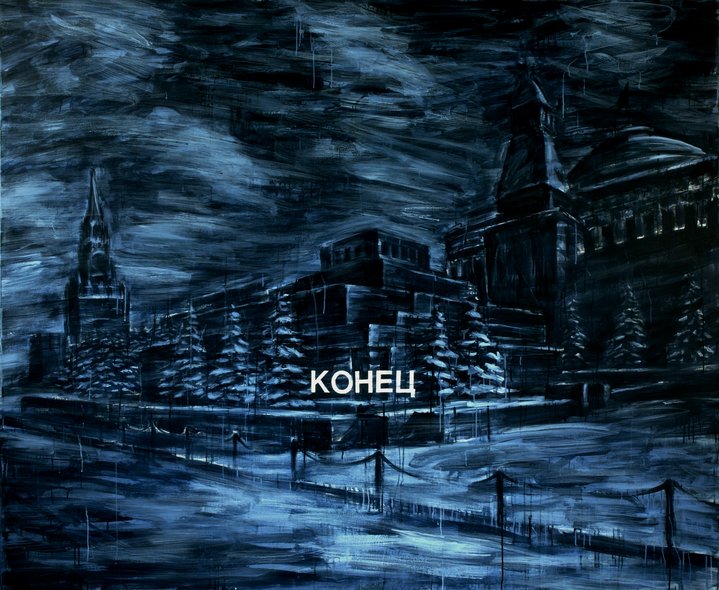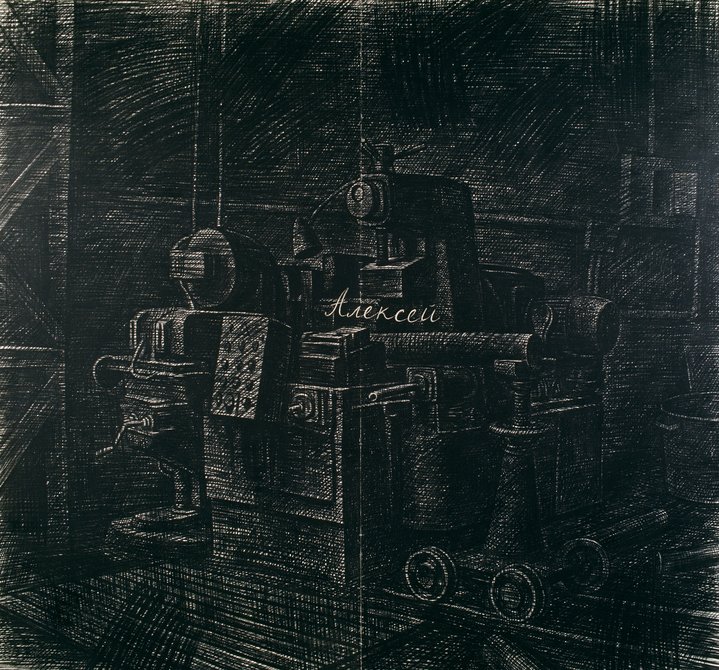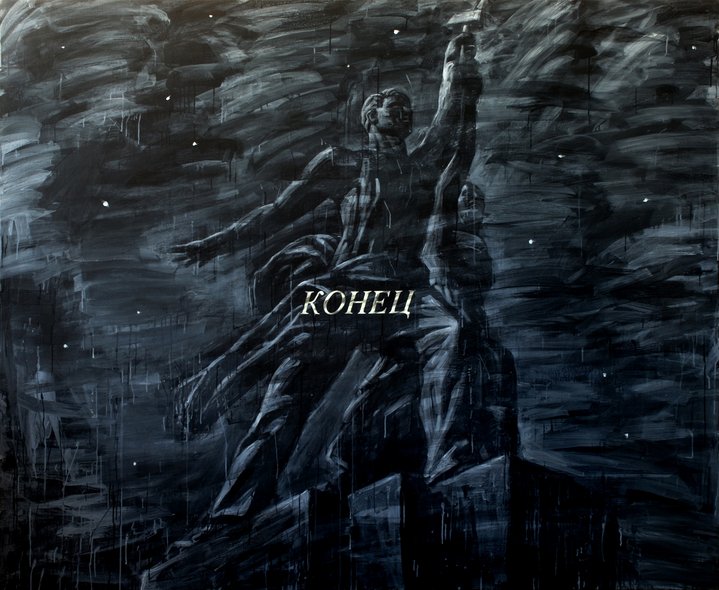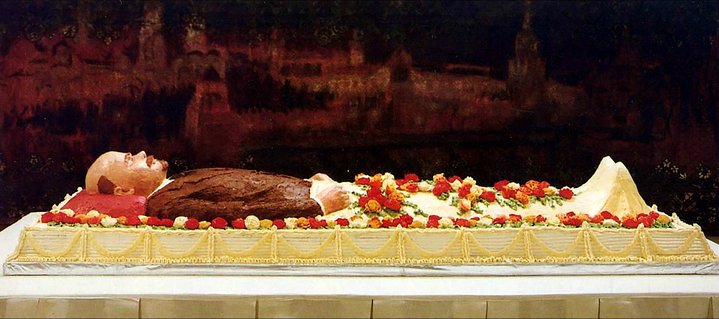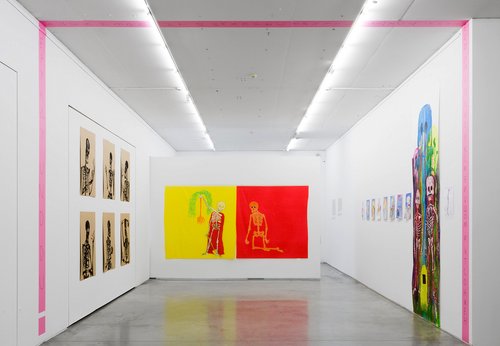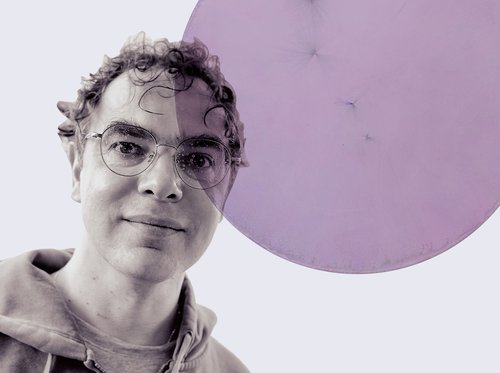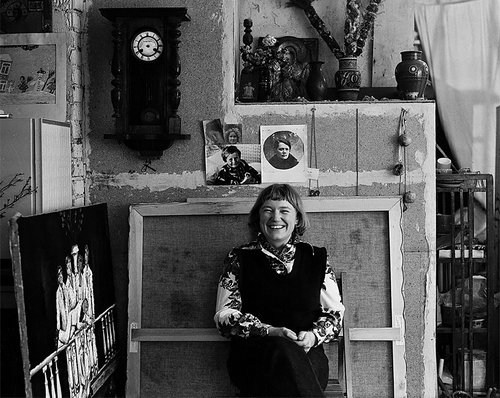Yuri Shabelnikov: Back to Black
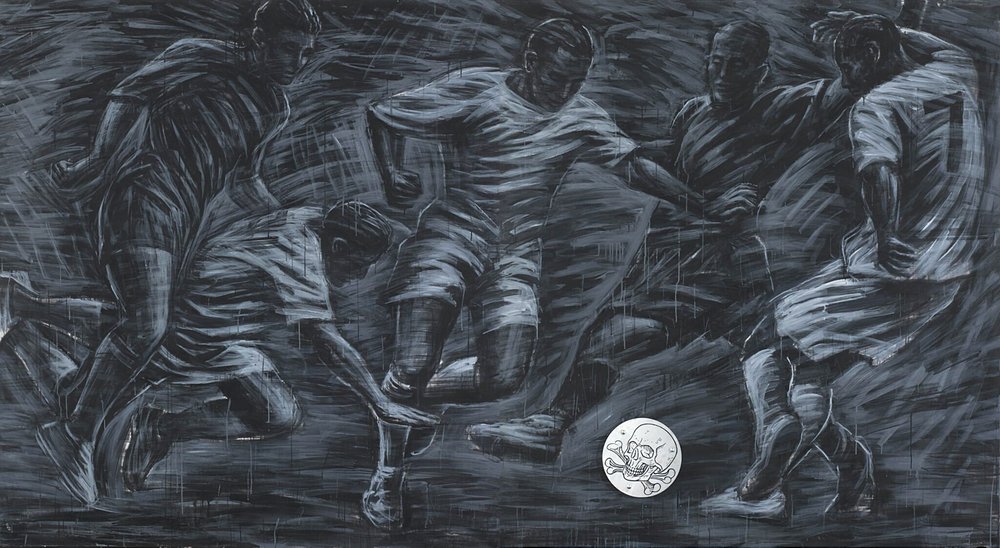
Yuri Shabelnikov. Vision No. 2, 2008. From the series 'Esoteric Football'. Courtesy of Sistema Gallery
A solo exhibition of the work of Yuri Shabelnikov is now on view at the Sistema Gallery in Moscow. From eating Lenin’s embalmed body in the form of a cake, to his enduring love of painting, the artist shares his reflections on art and mortality.
A spirit of mourning hangs over Yuri Shabelnikov’s (b. 1959) exhibition at the Sistema Gallery, a modest survey show culminating in a palette of large scale paintings consisting of different shades of black, from his series ‘Requiem of the Will’. Then you meet ‘The End’, these words written across the canvas in another series called “The End of a Film”, reminiscent of the final frame of some Hitchcock thriller. Each of these paintings is complemented by a ceramic toy on the floor, staring intensely at the ‘screen’. “The viewer is a toy”, Shabelnikov explained to me later when I asked him about the concept behind it.
We were talking in a café in Moscow just hours before the terrorist attack at the Krokus concert hall. In an era when tragic events unfold before our eyes in never-ending sequences while we stare at our screens, these works by Shabelnikov feel like a premonition. The words ‘The End’ spread over the night-time cityscapes of London and Paris, fading slowly into black. His works portend what I have felt for some time now, that the world as we know it is coming to an end. About his apocalyptic vision, the artist reflected, “Eschatology is inherent in Russian territory”. But he corrected my thoughts, the prophesy was not intended when he made it back in 2008. “The art of the cinema was coming to its end as an important and relevant form of art. I understood it back then already”, he recalls.
Born in Taganrog in the south of Russia, Shabelnikov’s path as an artist has been full of coincidences. While an art student in Rostov-on-Don, he became acquainted with a group of young artists, including Valery Koshlyakov (b. 1962) and Avdey Ter-Oganyan (b. 1961) with whom he founded an art collective called Iskusstvo ili Smert! (Art or Death!), an allusion to the Cuban revolution’s slogan ‘Patria o muerte!’ (Homeland or Death!). These young rebels considered art - not communist USSR - their homeland. “The three of us moved to Moscow, as for the others, four of them are already dead now. As you call a boat, so it will float,” Shabelnikov observes grimly. Very quickly into his calling as an artist, he discovered that he did not fit the official narrative and in 1978 he was expelled from the Graphic Arts Faculty of the Rostov Pedagogical Institute for political reasons. His unfavourable views on the role of the Communist Party in art seemed sacrilegious to his teachers. It was a matter of great irony that he eventually enrolled in another art school by virtue of his aunt’s good connections in a regional Party committee.
Shabelnikov has a keen eye for the absurd in society, of its hollowing symbols and shattering ideologies and in his best works, this absurd is exaggerated to epic proportions. In 1998 when public discussions about the fate of the enbalmed body of Lenin in the Mausoleum on the Red Square were in full swing, he and fellow artist Yuri Fesenko (b. 1955) came up with a performance called ‘Mausoleum. The Ritual Model’ which took place at Moscow’s now-defunct ‘Dar Gallery for Naive Art’. Exhibition goers were invited to eat a piece from a huge cake which was shaped like the enbalmed Lenin which the artists had baked themselves. “Pravda covered the prank using the headline Lenin-Eaters” recalls Shabelnikov. A group of parliament members filed a criminal case against the artists. Yet it was dropped for the absence of crime in the act. “It seemed like I had touched a nerve”, he recalls. He declines any allusions to the Christian sacrament of communion in the work, saying it was inspired by the line from a Soviet song: “Lenin is in you and in me”. Since then, Shabelnikov has turned down many invitations to repeat this performance. “Why do this in London for people who probably don’t even know what the Mausoleum is?” he says. The transient nature of culinary art fascinates him. He is interested in the metaphor, “You are what you eat” which he adds “you can take literally”. Back in 1995 in Taganrog, he created a Reichstag-shaped cake to be eaten by World War II veterans on Victory Day. It never happened because it was the 50th anniversary of the victory over the Nazis, and the town’s veterans were too busy at other events, and never made it to the museum, where the edible installation stood ready for them. “They called me from the local administration’s department of culture to ask how to spell installation!” Shabelnikov recalls. “That’s how provincial Taganrog was then.” He moved to Moscow as soon as he could, finding himself in the artistic squat at Baumanskaya Street, where he became an active figure on the contemporary art scene and in the 2000s and 2010s and taught generations of students at different art schools in the city.
Despite his interest in unconventional media, he has never given up his passion for the traditional art of painting. In ‘Requiem of the Will’, he observes the similarities between the artistic styles of different totalitarian regimes. He recalls feeling an urge to “bury” socialist realist imagery that seemed no longer relevant or interesting in the 1990s. The athletic figures on his canvases are reminiscent of both the images of athletes and workers typical in Socialist Realist art, and the young Arians from Leni Riefenstahl’s films. These figures fade into black too, and metal elements, solid, shiny and foreign to the very substance of the paintings are glued over them. “The metallic sign becomes more important than the painting underneath it, and that’s the whole point”, he explains.
Will we see the return of ideologically-charged art in Russia, I ask him. Shabelnikov thinks it is impossible today. “There is no ideology now”. Yet, looking at the figures on his canvases I cannot help but wonder: are they sinking into darkness, or coming back from it?
Yuri Shabelnikov. Unity. Harmony. Beauty. Academy of the Past
Moscow, Russia
28 February – 7 April, 2024






